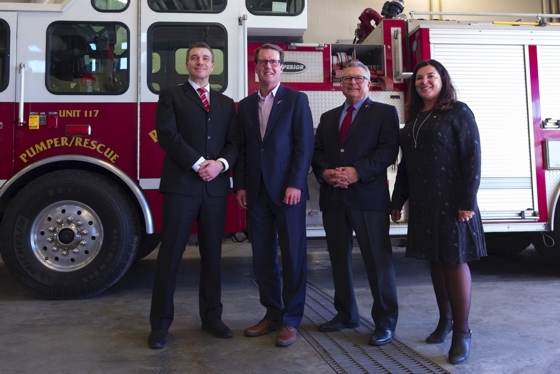
News
Consortium receives $30 million to support public safety personnel’s mental health
The University of Regina’s Canadian Institute for Public Safety Research and Treatment (CIPSRT), a pan-Canadian consortium, is receiving $30 million over five years from the federal government to address first responders’ and public safety personnel’s mental health concerns.
March 22, 2018 By Staff
 Left to right: Dr. Nick Carleton
Left to right: Dr. Nick Carleton “The traumatic incidents experienced by Canada’s public safety personnel during the course of their work can cause serious mental as well as physical injury, with women reporting even more symptoms than men,” said Vianne Timmons, president and vice-chancellor of the university. “For that reason, the need for evidence-based research to address mental injuries suffered by first responders and other public safety personnel in the line of duty is clear and pressing – particularly at a time when gender equality is in the public consciousness more than ever before.”
The funding is being allocated to two separate initiatives:
• $20 million over five years, beginning in 2018-19, to support a new national research consortium between the Canadian Institutes of Health Research and CIPSRT. This new consortium will work to address the incidence of post-traumatic stress injuries among public safety personnel.
• $10 million over five years, starting in 2018-19, for Public Safety Canada to work with CIPSRT to develop an Internet-based Cognitive Behavioural Therapy pilot as a means of providing greater access to care and treatment for public safety personnel across Canada. This will help address barriers to obtaining access to mental health supports for public safety personnel in rural and remote areas
Partnering with public safety personnel’s executives and associations, CIPSRT is a national network working with key stakeholders on a long-term initiative to identify the tools required to support the recognition, prevention, intervention, and treatment of mental health concerns facing Canadian first responders and other public safety personnel.
“Our public safety personnel choose careers that protect all of us; as such, we need to build the best possible systems to support and improve their lives and the lives of their families,” said Dr. Nick Carleton, professor of psychology and the scientific director at CIPSRT. “These investments support the development, implementation, and accessibility of evidence-based assessment tools, procedures, and treatments to reduce the impact of operational stress injuries.”
Print this page